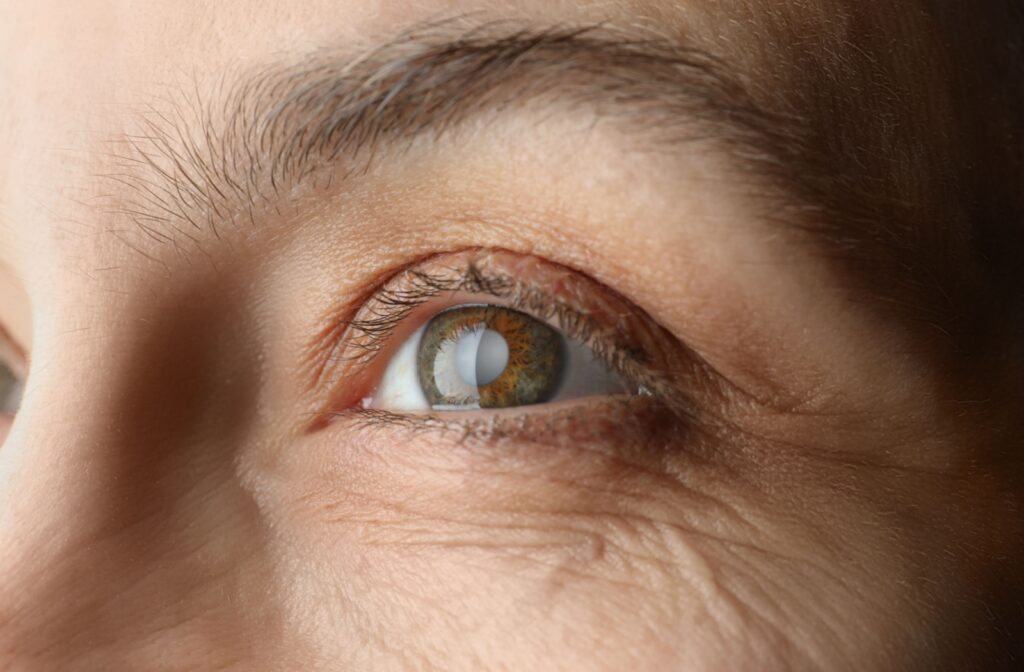Cataract surgery is a common procedure, with an estimated 3 million surgeries happening every year in the U.S. alone. More than half of Americans aged 80 and over will experience cataracts, so it’s understandable if you’re wondering about the procedure’s effectiveness. For instance, can cataracts come back after surgery?
No, cataracts cannot come back. This is because cataract surgery removes the natural lens of the eye. However, it is possible to develop secondary cataracts, otherwise known as posterior capsular opacification (PCO). It’s important to understand how to take care of yourself after cataract surgery. Regular comprehensive eye exams can identify cataracts in their early stages.
All About Cataracts & Cataract Surgery
A cataract is when a part of your eye’s lens has clouded over. The lens of the eye is a transparent structure inside the eye that, together with the cornea, focuses light onto the retina. Mild cataracts can be managed with lifestyle changes or prescription eyewear. However, if cataracts start getting in the way of activities like reading or driving, surgery may be necessary.
During cataract surgery, the natural cloudy lens is removed and replaced with an artificial intraocular lens (IOL). Most people recover from surgery in 8 weeks, and 9 out of 10 people experience better vision after surgery.
Cataract Surgery Risks
Cataract surgery is considered a “common, safe, and effective” procedure by the National Eye Institute. But like any medical procedure, it carries risks such as retinal detachment, infection, double vision, loss of vision, and atypical eye pressure changes. These issues are usually treatable, but it helps to identify them early. So contact your eye care team if you notice anything concerning after cataract surgery.
Can Cataracts Come Back After Surgery?
Cataracts can’t come back after surgery because the natural cloudy lens has been removed, along with any proteins that may degrade and cloud the lens. Artificial lenses can’t cloud over the way natural lenses can.
Another condition called “secondary cataracts” can occur after cataract surgery, but secondary cataracts aren’t actually true cataracts.
What Are Secondary Cataracts?
Medical professionals call secondary cataracts posterior capsular opacification (PCO). This condition is when the membrane around your eye’s lens gets cloudy. This can happen several months or even years after cataract surgery, and is attributed to the eye’s natural healing process.
PCO is a common phenomenon. Around half of people who undergo cataract surgery will experience PCO within 5 years. Treatment involves an outpatient procedure called YAG laser capsulotomy. This procedure should only take 5 minutes.

How to Care for Yourself After Cataract Surgery
Cataracts can’t come back after surgery, but it’s still a good idea to know how to take care of yourself after cataract removal. Your provider may schedule check-ups to see how well you’re recovering.
Protect Your Eyes
You may be provided with an eye shield to wear at night when you sleep. You may need to wear it for several nights. Avoid contact with your eye (e.g. touching, rubbing, scratching). You should also wear sunglasses when outdoors and take care not to get water or soap in your eye.
Ask When You Can Resume Regular Activities
After cataract surgery, have a discussion with your eye care team about what activities are safe to do and when you can start doing them. Activities of concern include:
- Certain physical motions: Don’t bend over or have your head below your waist within 48 hours post-surgery, as this can affect eye pressure and healing. Also avoid coughing and sneezing too hard.
- Visual tasks: Generally, you can resume reading, using the computer, and watching TV a few hours after cataract surgery, but you may experience some initial fuzzy vision.
- Exercise: You can start doing very light exercise (e.g. walking) the day after surgery, but wait longer before doing strenuous activities. Don’t swim for 2 weeks.
- Driving: Your depth perception may be affected, especially if you’ve only had cataract surgery in one eye. There are management options for people with strong prescriptions who need to drive between their first and second cataract surgeries, as these people may experience unbalanced vision.
Use Medication As Directed
You will be provided eye drops to support your recovery. Use them as directed.
If you use other eye drops for other eye conditions, ask your provider when you can start using them again. You should also discuss when you can resume treatments like warm compresses and lid scrubs for conditions like dry eye, blepharitis, and meibomian gland dysfunction.
Know the Signs of an Emergency
Some discomfort can be expected after cataract surgery. Common symptoms include:
- Blurry vision when you first remove your eye shield
- A feeling like there is something in your eye
- Redness in the white part of your eye
However, contact your provider right away if you notice:
- Pain in your eye
- Loss of vision
- Light flashes, shadows, or floaters
- Nausea and vomiting
- Heavy coughing
- Discharge from the eye
- Excessive eye redness
Care for Your Vision in Blackfoot, Idaho
If you’re over 60 years old, get a dilated eye exam every year or every other year to check for cataracts. The American Optometric Association (AOA) also recommends that most adults aged 65 and over undergo a comprehensive eye exam every year. Some people may require more frequent exams.
Optometrists at Bluebird Vision + Wellness offer comprehensive eye exams for adults and children in Blackfoot. We can also help you understand treatment options for cataracts. Contact us to book an appointment today.




